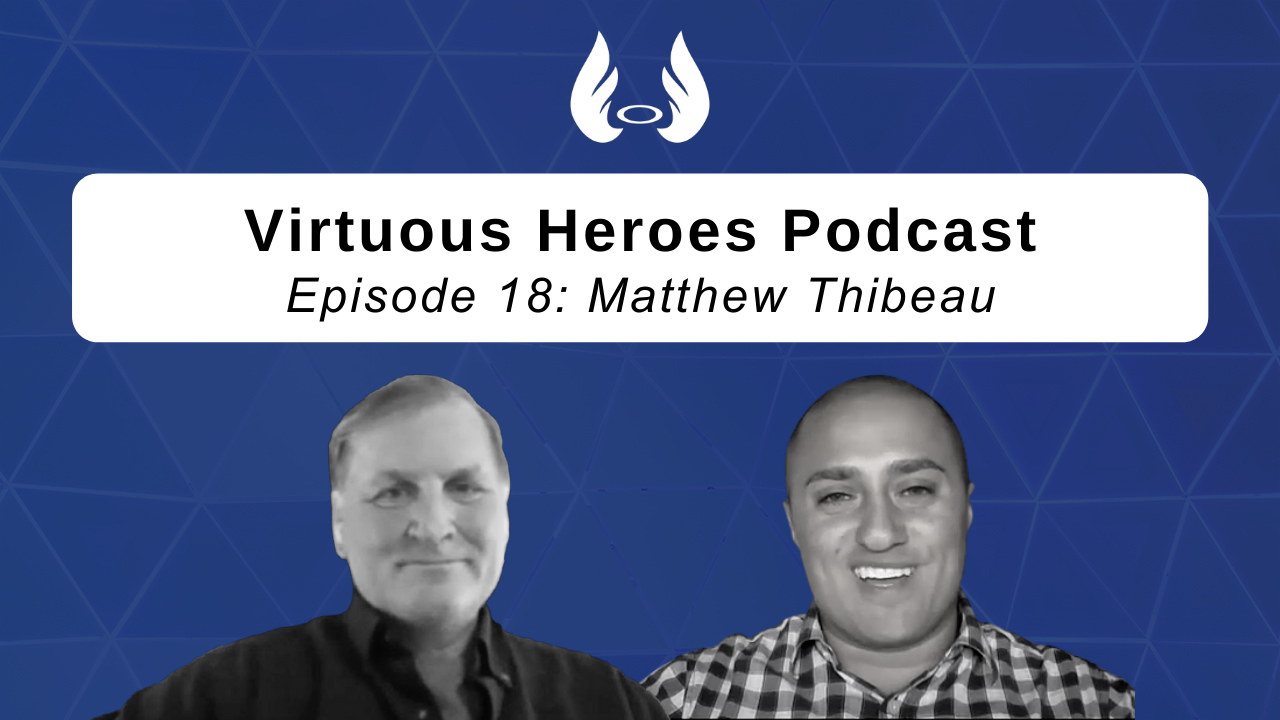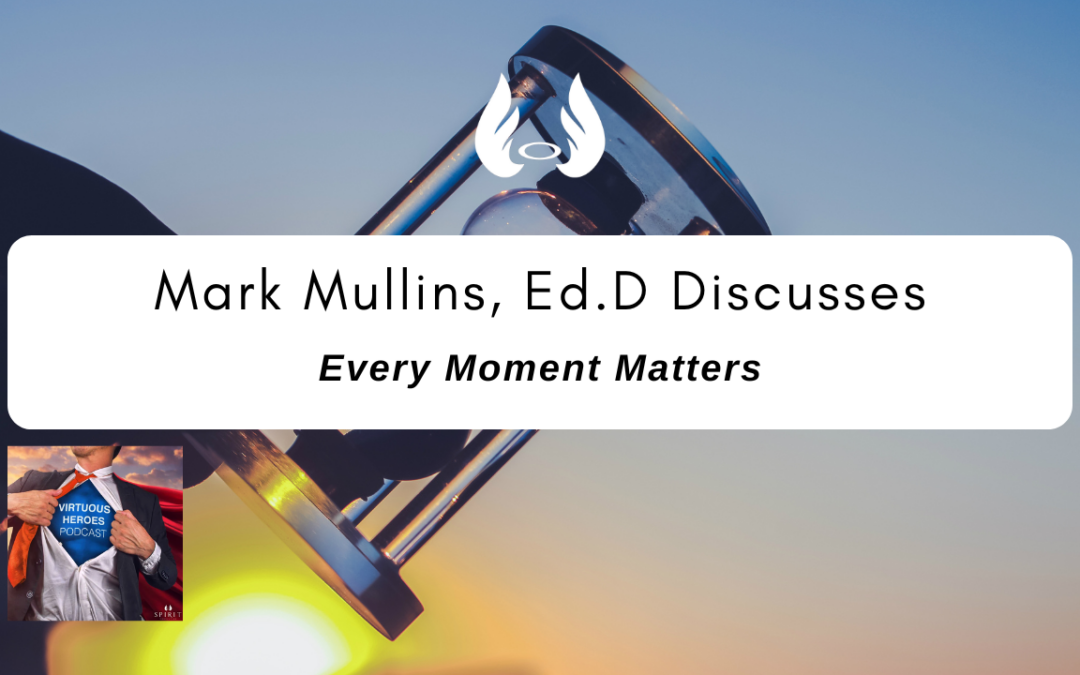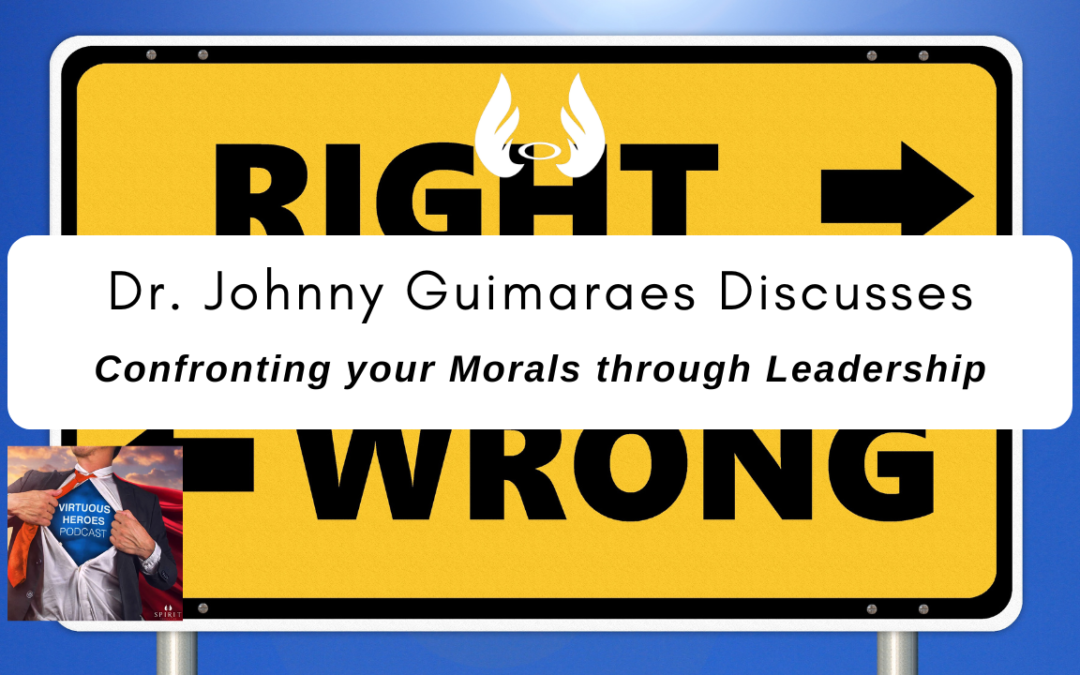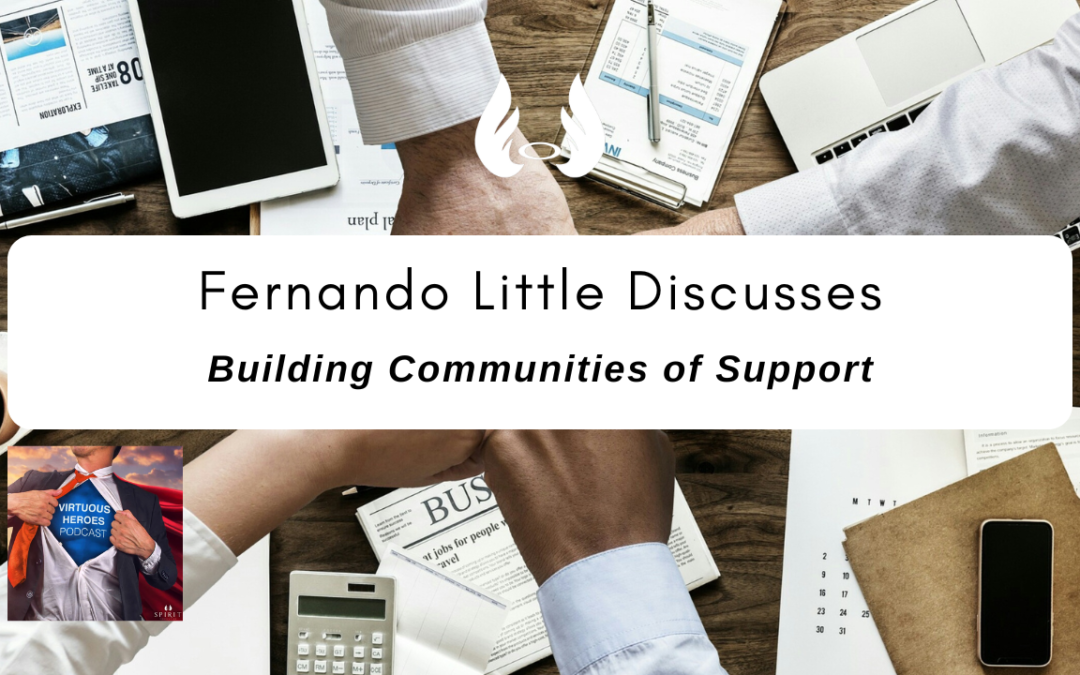Podcast episode
About our Guest
matthew thibeau
Matthew Thibeau is the Service Line Leader for Strategy Development, here at Spirit Consulting. He focuses on developing individuals to allow for organizational change; it is necessary that the clients take ownership of the processes used in order to meet the objectives of the organization. Also, Thibeau goes into detail regarding the importance of personal responsibility and shared accountability which ultimately leads to strong culture change.
In this episode, Thibeau shares what it took him to get to the leadership position he is in today and examples of experiences he has had with clients at the workplace, as well as what he is most excited for in the future. Finally, Thibeau goes into detail regarding where he has seen virtue and business intersect in his life, through making mistakes and trusting those within the organization.
In the past, Thibeau was a CEO of a publishing division for a large multinational company and also taught undergraduate students the subject of Strategic Planning. He has experience in acquisitions, business development, financial reporting, goal setting, market planning, mentoring, and organizational skills.
“The future is going to be created by those who engage in the process. Being told what to do, no longer works. Being given the resources, the empowerment and the encouragement by leaders to solve the problem and then go make it happen is what needs to happen.”
– Matthew Thibeau
EPISODE TRANSCRIPT
Hannah: Thanks for watching our podcast! Here at Spirit Consulting, our services include business strategy and human resources consulting. In HR we offer executive search executive coaching and work psychology consulting. Please visit us at spiritmco.com, where we fulfill our client’s dreams virtuously. Enjoy your show!
Chris: Welcome back to the Leading Virtuously Podcast. Matthew, thank you so much for joining us today.
Matthew: Chris honor, and a privilege to be with you today.
Chris: Great. Yeah, excited to be able to share the work that we’ve been doing. And this is a new one of having a spirit consulting member on the podcast.
So thank you for joining us, Matt, who are you?
Matthew: Matt Thibeau I’ve been a lifelong learner and leader who brings together both passion for leadership organizations someone that’s worked in multiple industries a very devoted husband and proud father.
Chris: Awesome. I love that. I love that.
And also for those that don’t know him, the service line leader for strategy development for spirit consulting as well.
Matthew: Very proud of that too, because of the quality of the clients we work with. That are attracted to us and our mission.
Chris: Yeah. Most definitely. It’s been a, it’s been a great year.
So Matt, can you tell us how you got to the leadership position that you’re in today?
Matthew: Really? It’s when you see an opportunity are you aware of. Are you ready to take action with a little bit of risk and do you trust? My career, which has been in the education space both publishing with major multinational corporations, as well as teaching in higher education really all the way up to CEO of a publishing division.
For a very large multinational, as well as teaching undergrads fundamentals of strategic planning. So it’s really been a career that has touched many opportunities for me to work with people, develop people and organizational change.
Chris: Excellent. Thank you for sharing. So in the strategy room what problem do you frequently solve, Matt?
Matthew: I think one of the biggest things that we have focused on is that in the strategy world, be it a strategic plan development or a maximisation of efficiency. It’s how do you get by. So we have developed and been successful with our clients in using a process that creates buy-in to the end product so that it’s not a consulting coming in and doing unto, but it is with them empowering in gendering them so that the process they make their own.
So they feel ownership over the end product.
Chris: Yes, most definitely. And it’s been exciting to be able to watch multiple different client organizations that are enjoying that process and really being able to just kinda transform their organizations based off of people leaning into the strategy that is, is being developed by the organization to
Matthew: I, I think you hit on it, Chris.
And it really is that sense of owner. If associates are committed to the mission and they take ownership of the process. Then they all celebrate in achieving the goals and objectives. It’s where people don’t feel an ownership to either process or end goals that there’s a disconnect within the organization.
So one of the things I’ve most enjoyed about our work at spirit consulting is how that process has walked the talk of culture change. And specifically one of the things that we work with upfront with the CEOs and the leaders is that we want to create a sense to two word phrases, personal responsibility, and shared accountability.
Personal responsibility. I own what I do shared accountability. I own that we’re in this together. When you create that culture, then magic can happen.
Chris: Excellent. Excellent. So can you give me an example of some of the work that you’ve done, that where whereby leveraging those disciplines is started to really take off for the Orgs?
Matthew: Specifically with a large nonprofit social service agency in the Midwest they had experienced through acquisition rapid growth. To not only a statewide presence, but then into a joining states. So one of the issues was culturally as new organizations are affiliated, how do you bring those people along?
Secondly, they also had a traditional strategic plan which certainly had wonderful metrics, but what it lacked was personal connectivity. To the people of the organization. So in meeting with the CEO she was as interested in creating a culture of engagement and empowerment. Again, our words, personal responsibility, shared accountability.
So she was looking for that, but also to, to create a sense that they could develop their people as leaders. So we really got a lot in addition to a strategic plan, which had all the identifiable metrics, goals, objectives that you would expect in the 11 month engagement. We also created among this ad hoc.
Group of emerging leaders, a real sense of ownership that it was not the CEO’s organization or the board’s organization, but it was my organization. And I will know Chris, that part of that occurred as we went into this current pandemic of COVID-19. So traditional methods of engaging people sharing a process had to be altered, but because of their ownership of the process, they took on the COVID-19 restrictions as an opportunity, not a threat.
And by the end of the process, the board voted unanimous. In support of the strategic plan with special acknowledgement to the leadership and this group of ad hoc emerging leaders that are being developed.
Chris: Absolutely. And yeah, it was I was going to say just to bring up the elements of like, when you’re in the middle of.
Specifically, as you’re dealing with strategy and around, around the culture of an organization with many different stakeholders that are involved and then throwing a pandemic in the middle of that, not a, not an easy thing to have to deal with. But yeah, I feel like he really navigated those waters incredibly well.
And we received just nothing but the highest marks from the board and CEO. So congrats and kudos to you on that as well. And that kind of leads us into what we were talking about before the, before we hopped on into the podcast too, was about what gets you the most excited about the future, Matt?
Matthew: It’s exactly that there will be. Please God, not another pandemic, but there are always challenges to organizations. There are always opportunities and the ability to develop leaders who embrace the challenge by thinking innovatively it’s, it’s bringing together people so that they solve their problem because then they’ll go do it.
It’s more than just creating a path. It’s more than just making sure you have the right vehicle to navigate the road, but to make sure that the right people are with you. And that’s why I’m so strong and passionate that the future is going to be created by those who engage in the process. Being told what to do no longer works.
Being given the resources, the empowerment and the encouragement by leaders to solve the problem and then go make it happen. That’s what I think the post pandemic is going to be. There is no going back to pre COVID. The overused phrase is what’s the new normal Chris. What I’m passionate about, what I believe spirit consulting is passionate about is that in this new normal, it’s going to be how we are with each other, the quality of our interactions, the engagement of our thought and the commitment of our skills.
So my passion for the future is that. There is a positive side to this pandemic, especially as it’s forced people to work remotely, it need to be more intentional about the process because you’re working remotely with a new definition, new paradigms to move forward. So I’m just incredibly passionate about what we can do, especially with leaders that want to look ahead.
And not those who are just looking to solve yesterday’s problems with yesterday’s process. It’s that easy. It’s not clear. And that’s where the fun is.
Chris: So this podcast is all about leading virtuously and I think you were really hitting the the nail on the head about what it’s going to look like when in the way that you lead and guide people.
In this new norm. And whereas I guess I’m just kinda curious, Matt just thinking about your own career, whereas like virtue in business been highlighted for you. Why have you had the revelation and the insights to, to lead and champion that way for other things?
Matthew: Mostly by making mistakes.
And I mean that I think we learned much more from our mistakes if we’re willing to I’ve worked early in my career for some mentors, bosses, high demand. But they allowed me to make, and they processed with me the learning of mistakes. So what that in gendered, Chris, and what I think is the key moving forward for leaders considering this is a very simple, but often overlooked five letter word called trust.
Do you trust your people? Do your people trust you when you talk about virtuous leadership, that’s the barometer that dictates everything. The level degree and intensity of trust, both vertically and horizontally, because in the example that we were just talking about, for the C-suite to call together a group of mid-level managers with this task of creating a strategic plan for their growing nonprofit, that was a real statement of trust.
And then for the people on the planning committee who hadn’t known each other or work together to develop that horizontal trust, that’s the magic sauce. That’s where things come together. So looking forward and if you think about virtue, what is more fundamental than tell me what the level of trust is.
And I’ll tell you how virtuous the organization acts.
Chris: Yeah, no I, no, I love that. Because at the end of the day yes, that as we know an operations, you can only go as far as the level of relationships and the trust that you build within the organization. And yeah, I would agree that. It’s a good a synonym for virtue being trust, that that’s, if you really are committed to loving people and doing always choosing the strategy, that’s a win-win for people and not choosing money over relationship.
And then that requires you to be able to build trust within those relationships as well. So I think that definitely holds true for sure.
Matthew: And the wonderful opportunity real quickly is to be creative about building trust when you’re working remotely. It’s just a fascinating thing that we’re going to come out to the, that those leaders can work with us to develop strategies so that horizontal and vertical trust can be celebrated in and in powering in a remote environment.
Chris: Yea because I think like now is the time it’s, the time has gone, where, being able to do your lunches and your. Your pizza parties, et cetera, to be able to celebrate the small things of like birthdays and stuff like that. So it’s how do you, in this new environment, how do you be able to have those non-work functions that are geared towards the relationship?
That were easy for us to be able to do in the past to operationalize and to just automate by, having those reminders to do birthday parties and entry and exits celebrations, et cetera, that our team win, like team building kind of things that you can’t do in this remote environment, too.
Matthew: And again, back to the example that we’re citing, where we had to move to. Committee meetings that were 12 boxes on a screen, as opposed to being in a room where you had coffee, you had refreshments. So it’s a whole different environment and what I’m passionate about. It’s just a wonderful opportunity.
Chris: Excellent. So the final, quick, I got two more questions for you, Matt. So the second to last is. Like we talk about building trust and virtue in business. But, and as you mentioned that really for you, it was a matter of failing to be able to get there, versus are there some of those is there a specific example that comes to mind of where.
You’ve had that failure in your career. That was an aha moment of I really need to, and as you started the process where the mentor okay, I probably need to be doing things differently.
Matthew: Early on in my career, I was involved in mergers and acquisitions in the publishing world, specifically the education sub market.
And I remember flying. To a acquisition and the CFO saying, what do you think we’re doing? And I said we’re going to do due diligence. We’re going to understand we’re going to talk with people. He said, no, it’s done diligence. He said, the CEOs have already agreed. We’re going to go out and prove that they’re smart.
So what that did, Chris? It opened up for me a relationship because I became a president of that new division. Was that with my boss? I could say, when we conducted our due diligence, we saw these things and this is the headwind. I think there’s a couple of ways we can address it.
Can you talk, let’s talk through those. So that leader as mentor leader, that I could trust being vulnerable with saying I’m not the guy who has the answer. I’m a guy who I identified the opportunity. When we made the right choices we celebrated, when we didn’t, we said let’s learn. I also had the experience of working for someone who had no injuries.
Just said, tell me the result and then go do it. So it was a very autocratic versus shared a very much of just hit the deliverables. Don’t bore me with the process. That experience led me to be so passionate. That process can be as important as. People development and how you do it virtuously by developing horizontal and vertical trust is what’s going to separate true leaders in the new normal.
Chris: Excellent. Thank you for sharing. And I think there’s a ton to impact of what you just shared with our audience. How can people get ahold of you, Matt, in the work that you’re doing at Spirit Consulting?
Matthew: Certainly through a spirit consulting dot com and through my web page there I’m Matthewthibeau@spiritconsulting.com.
Chris: Excellent. Absolutely. We’ll thank you so much for for being on the podcast today and. Yeah. Just a real joy to, to have been working with you over these last couple of years, I’m excited about being able to help organizations work through this new normal as well.
Matthew: Great. Thank you Chris, for the opportunity that we’ve had and to all the opportunities in the future, let’s always be blessed.
Chris: Thank you, Matt. Take care.
Chris: Hey, Chris here.
Hope you enjoyed the episode where we discussed all things going bald, just joking, the Leading Virtuously Podcast. If you enjoyed the episode and the podcast, will you please subscribe on YouTube or apple podcasts or Spotify, or you can also share it with a friend that would be tubular. I hope you have an awesome day.









0 Comments